India's Third Giant Leap
This Could be One of the Biggest Opportunities for Investors
- Home
- Views On News
- May 6, 2023 - Top 5 EV Charging Infrastructure Stocks to Add to Your Watchlist
Top 5 EV Charging Infrastructure Stocks to Add to Your Watchlist
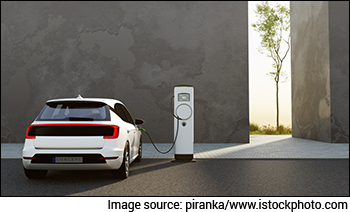
In December 2022 on a fine sunny day, a research report made us take note of the opportunity in electric vehicle (EV) charging infra companies in the coming years.
It talked about how India will require more than 63,000 charging stations and cumulative investments of Rs 269 billion (bn) for setting them up over the next five years.
The report went one step ahead and projected the same for 10 years. Turns out, India could need 0.23 million (m) charging stations, entailing a total investment of Rs 1 trillion (tn) by 2032. The investment value could go up, in line with inflation as well as demand pick-up in the EV industry.
The projected growth of EV charging infrastructure in India is a clear indicator of the immense potential this sector holds. As the demand for EVs continues to grow, so will the need for charging stations, creating a significant opportunity for companies operating in this space.
Along with the Faster Adoption and Manufacturing of Electric Vehicles (FAME) scheme, the government has been offering capital subsidies for installing charging stations. Many companies, listed and unlisted, are investing big time into establishing EV charging infrastructure in India.
Let's take a look at the top EV charging infrastructure stocks that could turn out to be the biggest beneficiaries.
#1 Tata Power
Along with betting big on green energy, turns out Tata Power is aggressively investing in EV charging stations.
For EV infrastructure in India, Tata Power is to EVs, what Samsung was to Android. It's the first company to set up an EV charging station.
In the post Covid rally, the company benefited strongly as increased economic activity drove up electricity demand while its strong investment in EV charging stations, solar infrastructure, and other expansions added to sentiment.
Tata Power has plans to install EV chargers all over India, with an expected 100,000 charging stations over the next 10 years.
The company has tied up with Tata Motors to provide home charger solutions to every EV owner.
It has already installed nearly 15,000 home chargers and almost two thousand public chargers in over 160 cities and highways between cities.
Besides this, the company also provides fleet charging facilities along with captive charging for public transportation and buses at their depots.
In February 2022, Tata Power partnered with Apollo Tyres to deploy public charging stations at the latter's commercial and passenger vehicle zones spread across the country.
In April 2022, the company signed a memorandum of understanding with National Real Estate Development Council to install up to 5,000 EV charging points across its member's developer properties in Maharashtra.
In line with Tata Power's 'Do Green' mission, the company has completed the installation of 150 green energy-powered EV charging stations across Mumbai.
The company has also tied up with real estate companies such as Kolte Patil, Vatika group, and Rustomjee group, among others to install EV charging stations at their properties.
Foraying into the EV charging infrastructure aided Tata Power to deliver electrifying performance in the past year.
The company's revenue jumped 44% from Rs 77.2 bn in 2020 to Rs 111 bn for the financial year ended 31 March 2022.
Net profit zoomed 1,779% to Rs 27.8 bn from Rs 1.4 bn for the same period.
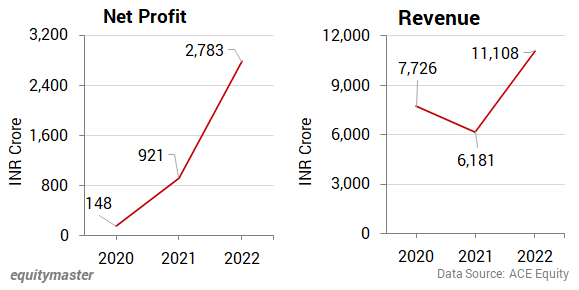
It remains to be seen how the EV journey pans out as the Tata group company has an ambitious target to triple its revenue and quadruple its PAT by 2027.
#2 ABB India
Next on the list is ABB India. ABB is a world leader in fast charging solutions. It has installed more than 14,000 DC fast chargers in over 80 countries.
The company is a subsidiary of ABB Group, one of the largest integrated power equipment manufacturers globally.
ABB India operates in four business divisions - electrification, robotics and discrete automation, motion, and process automation. The electrification business is responsible for providing charging solutions, products, and services in the power industry.
ABB India has been at the forefront of developing EV charging infrastructure solutions. The company has recently launched the fastest EV charger globally, Terra 360, which can deliver a range of 100 km with just 3 minutes of charging. This technology is expected to be accessible in India soon.
Since 2010, ABB has consistently invested in delivering power for the transportation of tomorrow. It's now the partner of choice for the world's biggest electric vehicle OEMs and nationwide EV charging network operators.
In 2020, ABB launched the first public DC fast charger in Delhi in association with EV Motors India for BYPL. Since then, ABB has tied up with local partners to set up charging stations.
The company is set to play a critical role in expanding ABB Group's global footprint in the EV charging infrastructure space. It gets strong support from its parent company as the research and development operations of the ABB Group are centralised.
Its partnership with the parent company ABB Ltd gives it access to cutting-edge technology and resources, which will help it maintain its position in the market.
In terms of financial performance, ABB India has demonstrated steady growth over the years. Shares of the company are currently trading at their all-time high levels.

#3 Oil Marketing Companies (IOC, BPCL, and HPCL)
Recently, the government announced that India's public sector undertaking (PSU) oil companies will get a subsidy of Rs 8 bn to set up 7,432 EV charging stations.
Oil marketing companies like Indian Oil, Bharat Petroleum, and HPCL are setting up EV charging stations aggressively. This is because...
# Diversification: With the growing demand for electric vehicles (EVs), oil marketing companies are diversifying their business to tap into this emerging market.
They know that the world is moving towards a cleaner and more sustainable future and there's a need to adapt to changing market dynamics and invest in new technologies.
# Meeting regulatory requirements: Governments around the world are implementing policies to reduce carbon emissions and encourage the adoption of electric vehicles. Oil marketing companies are setting up EV charging stations to comply with these regulations and contribute to a greener future.
# Revenue generation: EV charging stations can be a source of revenue for oil marketing companies. By setting up charging stations, they can earn income from charging fees and provide a new service to their customers.
# Customer convenience: As more people adopt EVs, they will need convenient and accessible charging infrastructure. Oil marketing companies can leverage their existing network of fuel stations to provide this service to their customers.
Among Indian PSUs, IOC, HPCL and BPCL are taking the lead in this initiative. State run IOC is pivoting its business in some way and slowly moving away from petrochemicals. It's planning to turn petrol pumps into energy outlets that can offer EV charging points and battery swapping.
In the coming two years, IOC will have EV charging facility at more than 10,000 fuel stations. Meanwhile, state run BPCL plans to transform 7,000 conventional outlets into energy stations to support electric mobility in the next few years.
Recently, BPCL announced that it launched 19 EV fast-charging stations at 110 fuel stations along 15 highways in Karnataka, Kerala, and Tamil Nadu.
Meanwhile, several companies including Hero MotoCorp, Bharat Electronics, among others have collaborated with HPCL to set up EV charging stations.
The government plans to set up one charging station for every 25 km on both sides of expressways and highways, and these state-run PSUs could be the biggest beneficiaries.
So these are the companies that are leading the race when it comes to EV charging infrastructure. A robust network of charging stations is being developed by several large companies. Many companies, listed and unlisted, are already knee-deep into establishing EV charging infrastructure in India.
So which EV stock should you invest in?
Before you zero in on any, we recommend you watch the video below to study the results of our latest research project.
Also check out the below list of EV charging infra stocks that we highlighted in early 2022.
Top 5 EV Charging Infrastructure Stocks to Add to Your Watchlist (as of 2022)
The centre has come out with good news for EV infrastructure companies in India.
In a recent conference, held on 15 and 16 September 2022, Union Power Secretary Alok Kumar said that the central government will amend the Faster Adoption and Manufacturing of Hybrid and Electric Vehicles (FAME II).
At present there is no subsidy for the upstream infrastructure. However, this might soon change. The government is planning to give subsidy for setting up EV charging stations.
The primary focus will be setting up EV charging station on highways, expressways, petrol pumps and in small towns.
Oil marketing companies (OMCs) will be the biggest beneficiaries of the subsidy since they plan to set up EV charging infrastructure on 8 to 10 major national highways by 2025.
At the start of this year, we wrote to you about the top 5 EV charging infrastructure stocks.
Top EV Charging Infra Stocks in India
| Company | CMP (Rs) | YTD Change (%) |
|---|---|---|
| Tata Power | 234 | 6% |
| IOC | 70 | -6% |
| BPCL | 321 | -17% |
| Reliance Industries | 2,505 | 6% |
| ABB India | 3,123 | 40% |
The above list is extremely relevant today as these companies stand to benefit the most from the changes happening in the electric vehicle sector.
Continue reading to know more...
India's Top EV Charging Infrastructure Stocks
There is so much hype around electric vehicles (EV) worldwide.
And for good reason.
EV manufacturers are investing a lot of money in producing new models and developing a comprehensive EV portfolio.
The government is also encouraging to shift to EVs with its policies and initiatives.
However, it's highly unlikely that electric vehicles will succeed without proper EV charging infrastructure. Hence EV makers are concentrating on developing EV charging stations across the country.
Here are five companies developing a charging infrastructure network across India.
#1 Tata Power
The first company on our list of EV charging stations is Tata Power.
As India's largest integrated power company, its no surprise that it's on our list.
It offers EV charging solutions across all segments, including home charging, public charging, workplace charging, and captive charging.
The company has partnered with various EV makers such as Tata Motors, TVS, MG Motor India, and Jaguar Land Rover (JLR) India to develop charging infrastructure.
It has also tied up with original equipment manufacturers (OEMs) to deploy all types of chargers at its charging stations.
As of September 2021, Tata Power installed around 5,458 home charging points, 32 e-bus charging stations, 878 EV charging stations in India.
Recently, the company tied up with Lodha Group and Central Railway Mumbai to provide EV charging solutions in Pune and Mumbai.
It has also developed an EV charging app to locate the nearest charging station, get updates on charging, and pay charges online.
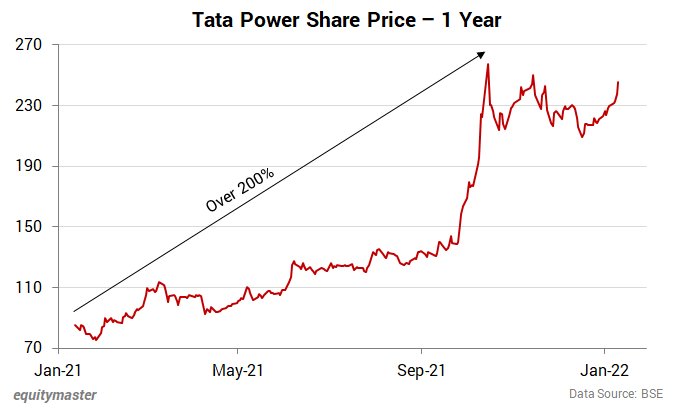
#2 Indian Oil Corporation
Second on our list is Indian Oil Corporation, India's largest oil refining & petroleum marketing company.
Indian Oil plans to install EV charging facilities at 10,000 fuel stations in the next three years. It currently has 448 EV charging stations and 30 battery swapping stations across the country.
It has also collaborated with EV makers and power companies such as Hyundai, Mahindra, Ola, NTPC, and Tata Power to set up EV chargers at fuel stations.
The company is evaluating emerging trends in mobility and the EV value chain to identify business opportunities to stay ahead in this transition.
As a part of its 'zero-emission electric mobility mission', it has set up the first hybrid microgrid to charge EVs using solar power, battery storage, and grid power.
The company also collaborated with Sun Mobility and Phinergy of Israel to strengthen its green energy presence and commercialise aluminium air battery technology in India.
Moreover, it has been exploring Solid Oxide Fuel Cell (SOFC) to generate clean, reliable, and affordable green energy for EV charging.
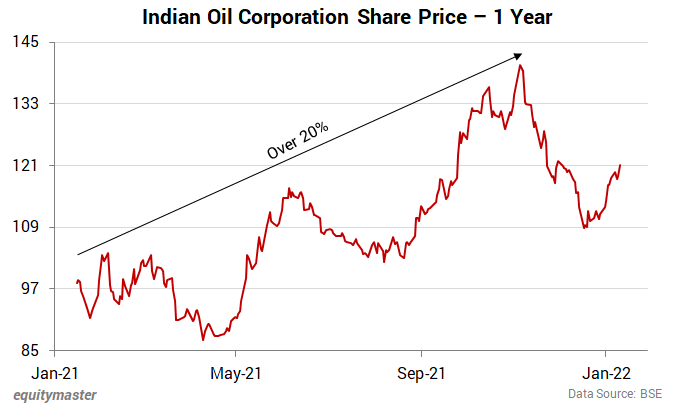
#3 Bharat Petroleum Corporation
Next on our list is Bharat Petroleum Corporation, an integrated refining and marketing company.
It's India's second-largest oil marketing company and third-largest refining company with a network of 19,000 outlets.
Currently, the company runs 44 EV charging stations and plans to add another 1,000 outlets by October 2022.
It plans to transform 7,000 conventional outlets into energy stations to support electric mobility in the next few years.
These stations will provide multiple fuel options, including EV charging, compressed natural gas (CNG), petrol, diesel, flexi fuels, and hydrogen.
The company plans to invest Rs 50 bn in the next five years through an inorganic route to expand its renewable power portfolio to 1,000 megawatts (MW) from its existing capacity of 45 MW.
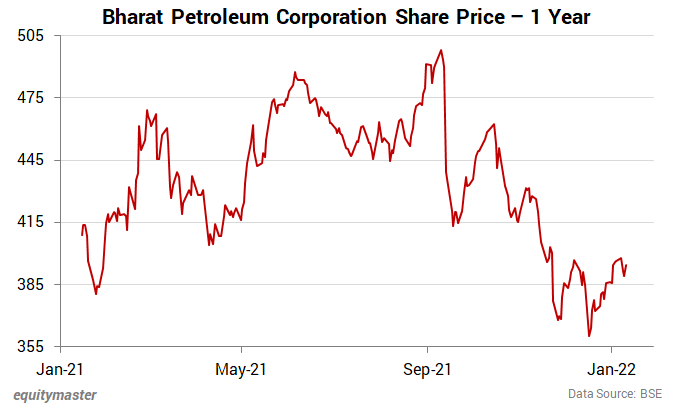
#4 Reliance Industries
Reliance Industries, the largest private-sector corporation in India, is fourth on our list.
The company is already an established player in the petroleum and refinery business and is the second-largest refinery in the country.
To set up EV charging stations in the country, Reliance has tied up with British Petroleum under the name Jio-BP.
In the first phase of the plan, Jio-BP will set up EV charging stations across the Delhi-NCR region to charge a minimum of 30 cars in each station.
The first EV charging station has already been established in Mumbai with multiple fuelling choices.
It has partnered with BluSmart, an EV ride-hailing platform, to set up an EV charging network with the latest technology in India.
Jio-BP has also tied up with Mahindra Group to provide charging solutions to EVs made by the latter using mobility-as-a-service (MaaS) and battery-as-a-service (BaaS) models.
Currently, it operates a network of 1,400 petrol pumps in the country. It plans to expand this to 5,500 pumps in the next five years with multiple fueling options, including EV charging.
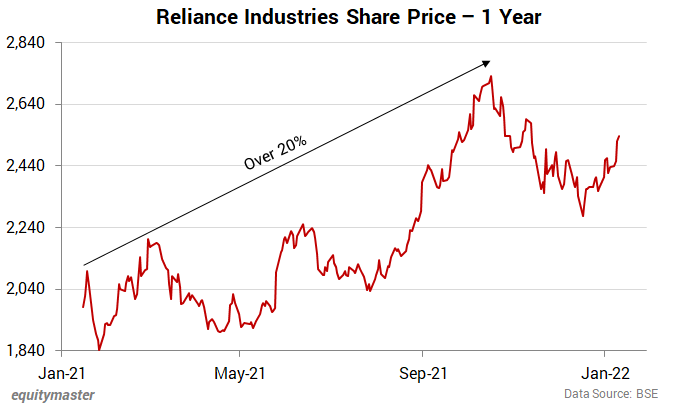
#5 ABB India
Last on our list is ABB India, one of the largest integrated power equipment manufacturers.
It primarily has four business divisions - electrification, robotics and discrete automation, motion, and process automation.
The electrification business provides products, charging solutions and services in the power industry.
It deploys high-quality AC chargers and fast-charging DC chargers to offer charging solutions.
ABB also recently developed and launched the fastest EV charger globally, Terra 360. It has the capability to deliver a range of 100 km with 3 minutes of charging.
The company is all set to launch Terra 360 in different countries. It won't be long before this technology will be accessible in India.
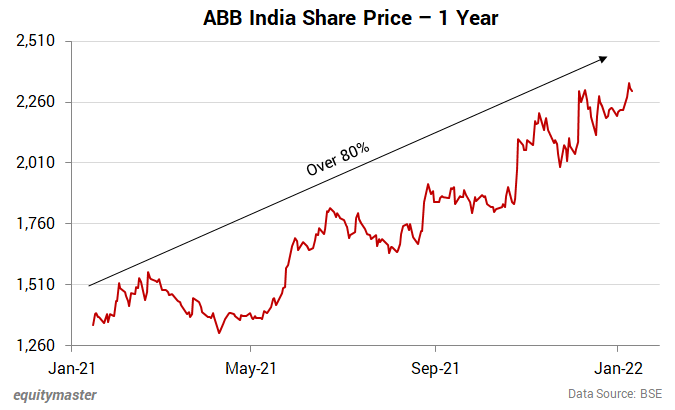
Should you invest in EV charging infrastructure stocks?
After lithium-ion batteries that are at the heart of electric vehicles, charging points are the next most important thing.
In the next five years, the EV charging stations are estimated to be a US$29.7 bn business, growing at a CAGR of 40% between 2020-2027.
The government has been encouraging the adoption of EVs in the country and has planned to set up 70,000 EV charging stations across the country in the next few years.
Many companies, listed and unlisted, are already knee-deep into establishing EV charging infrastructure in India.
So which EV stock should you invest in?
Before you zero in on any, we recommend you watch the below video to study the results of our latest research project.
You can also check out the playlist on electric vehicles Equitymaster's YouTube channel
Disclaimer: This article is for information purposes only. It is not a stock recommendation and should not be treated as such. Learn more about our recommendation services here...
FAQs
Which are the top electric vehicles companies in India?
Based on marketcap, these are the top electric vehicles companies in India:
You can see the full list of electric vehicles stocks here.
And for a fundamental analysis of the above companies, check out Equitymaster’s Indian stock screener which has a separate screen for best electric vehicle companies in India.
What are the top gainers and top losers within the electric vehicles sector today?
Within the Electric Vehicle sector, the top gainers were KABRA EXTRUSION (up 4.6%) and HBL POWER (up 4.1%). On the other hand, OLECTRA GREENTECH (down 2.7%) and UNO MINDA (down 1.2%) were among the top losers.
For more, please visit the BSE auto index live chart and also check out our automobile sector report.
How should you value electric vehicles companies?
Investing in stocks requires careful analysis of financial data to find out a company's true worth. However, an easier way to find out about a company's performance is to look at its financial ratios.
Two commonly used financial ratios used in the valuation of stocks are -
Price to Earnings Ratio (P/E) - It compares the company's stock price with its earnings per share. The higher the P/E ratio, the more expensive the stock.
Price to Book Value Ratio (P/BV) - It compares a firm's market capitalization to its book value. A high P/BV indicates markets believe the company's assets to be undervalued and vice versa.
To know more about the automobile sector's past and ongoing performance, have a look at the performance of the NIFTY Auto Index and BSE Auto Index.


Equitymaster requests your view! Post a comment on "Top 5 EV Charging Infrastructure Stocks to Add to Your Watchlist". Click here!
Comments are moderated by Equitymaster, in accordance with the Terms of Use, and may not appear
on this article until they have been reviewed and deemed appropriate for posting.
In the meantime, you may want to share this article with your friends!